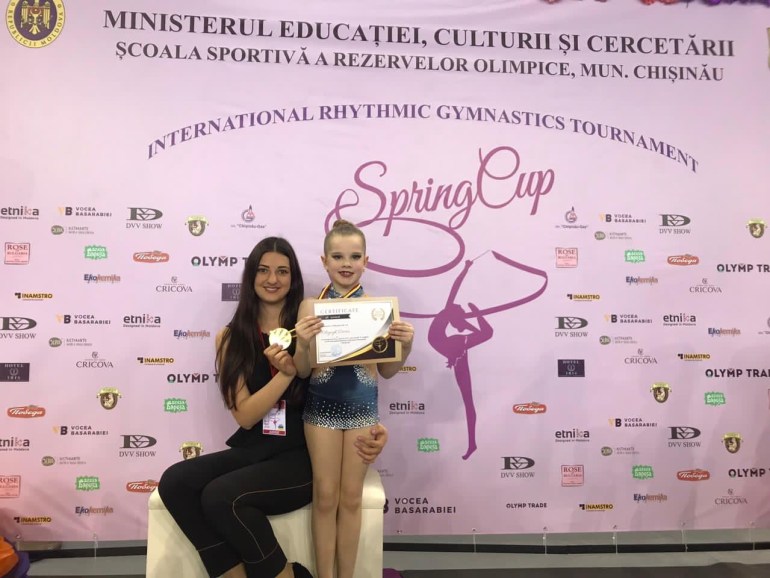Ukrainian gymnast, 10: ‘I can’t put my athletic career on hold’
With her mother and baby brother, Daria Oliinyk, or Dasha, as she is known, fled Ukraine to Romania and now trains via Zoom.
![[Courtesy of Marta Repetatska, Dasha's coach]](/wp-content/uploads/2022/04/23cbf0f0-a66e-405b-ba62-1cc9eb9ab560.jpg?resize=770%2C513&quality=80)
In a white house decorated with flowers and butterflies set in the Romanian Carpathian mountains, young Ukrainian children run around. Older kids sit in front of laptops, preparing to start online school. Dogs bark outside. Mothers prepare breakfast.
Since March, 21 refugee children and 13 adults have been staying at this temporary shelter, which before the war was used as an activities centre, to organise summer camps for young Romanians with cancer.
Keep reading
list of 3 itemsSerbians vote in election overshadowed by Russia’s war in Ukraine
Ukraine’s president accuses Russia of committing ‘genocide’
Ten-year-old Daria Oliinyk, or Dasha, as she is known, is among them.
A competitive gymnast, her days are filled with online school classes and in the evening, she trains for 90 minutes via Zoom with her coach, who is now in Poland having also fled Ukraine.
Dasha arrived at the Romanian centre – run by the Asociatia Magic nonprofit – on March 3, with her mother, Natalia, and five-month-old brother, Sasha.
Her father, Olech, stayed behind in their hometown of Vinnytsia in central Ukraine, like most Ukrainian men of fighting age.

It took the young family three days to drive from Ukraine through Moldova and into Romania, waiting for hours at congested border crossings and stopping several times to ask for directions.
But soon after they arrived at the centre, Dasha asked one of the volunteers for an exercise mat. Assuming the girl wanted to play with her dolls, the volunteer offered her a blanket. She refused it and demanded a “real” exercise mat.
“I can’t put my athletic career on hold because of a war,” Dasha, who has been training since she was three, told Al Jazeera.
Before the Russian invasion of Ukraine, Dasha was training for three hours a day, six days a week.
But her daily visits to the gym have been replaced by Zoom sessions with fellow young gymnasts, just three times a week.
The sessions create a sense of continuity, said coach Marta Repetatska.
“I would like them to train a little bit so they can relax and for some time, forget about the situation in Ukraine,” she said.
![[Courtesy of Marta Repetatska]](/wp-content/uploads/2022/04/1874896e-9742-4aae-b63d-6c70ee2a2e48.jpg?w=768&resize=768%2C1024)
Children make up half of the Ukrainian refugee population, according to UNICEF.
Experts say continuous access to education gives children some stability and a sense of belonging at a time of uncertainty.
Natalia gently pushes her daughter to stay on top of her schoolwork and maintain a strong work ethic.
“I support her, and I help her, and if necessary, I insist and lay down rules. Because she is a little person who needs her education, and she cannot fall behind,” Natalia said. “I tell her that sometimes in life if it’s hard, you can stop a little, you can cry a little, and then you keep going.”
Dasha’s school in a city south of Kyiv holds four hours of online classes a day, a similar routine to the pandemic but with some essential differences.
For example, if the alarms go off in Vinnytsia, classes are interrupted as teachers take shelter. The school has been transformed into a refugee centre for people from areas more gravely affected by the war, such as in northern and eastern Ukraine.
The exercise mats that Dasha used to train on in physical education classes now serve as mattresses for the refugees.
Training remotely was challenging at first for Dasha. But slowly, other children from the Romanian centre joined the Zoom sessions. They were far from able to do the splits, but encouraged Dasha and helped her feel less alone.
![[Courtesy of Asociatia Magic]](/wp-content/uploads/2022/04/4f7fa6c9-f149-4e85-8a2f-4dddd20b1d1c1.jpg?w=770&resize=770%2C433)
“I really miss my gymnastics colleagues and friends, and I wish I could exercise and work together at the same gym,” Dasha said.
Repetatska described Dasha as a “very talented” gymnast.
“Now it is the time when she must show her best results in gymnastics. Unfortunately, the war changed everything,” she said.
While training via Zoom offers consistency, it will fail to keep the gymnasts in shape, Repetatska said.
She has been trying to find new temporary coaches for the gymnasts in the countries where they are.
In Dasha’s case, the Romanian Federation of Rhythmic Gymnastics has offered to train her.
She is open to the change, but would prefer to return to Ukraine, be with her father and pick up where she left off.
“I want to reach my objectives and continue on the path I was on,” she said.